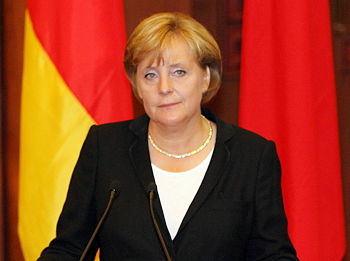Germany’s obstinate chancellor
固執的德國總理
Angela Merkel, swimming instructor
“游泳教練”安吉拉·默克爾
When it comes to the euro, the German chancellor prefers self-help to help—but she can be more flexible than she seems
德國總理在歐元問題上嘉勉自救勝過人救,不過她這個表面上的立場仍可通融。
WHEN warnings sound that the end of the euro is nigh, all eyes turn to Angela Merkel, the German chancellor. Germany must “assume its part” in saving the currency, says Spain’s economy minister, Luis de Guindos. If there is rescuing to be done, Germany is the obvious rescuer. Yet rather than toss out the lifebelt, Mrs Merkel offers swimming lessons.
歐元瓦解的警報就將拉響,所有人的目光都聚焦在德國總理安吉拉.默克爾的身上。西班牙財政部長金多斯(Luis de Guindos)說,德國必須在拯救歐元的行動中“承擔相應的責任”。若真有國家亟待救援,德國顯然是拯救者。然而,默克爾女士卻選擇站在岸邊教游泳,而非拋出救生圈。

She would find this characterisation unfair. Time and again she has taken stands against bail-outs only to relent. She balked at bailing out Greece and at a permanent rescue fund, and she vetoed the use of bail-out money to buy government bonds in the secondary market. In each case she gave in (too late,say critics).
默克爾女士也許會認為此般描述有失公正。她一次又一次地反對紓困, 到頭來卻總是松口讓步。她在救助希臘和永久性救援基金上躊躇不決,還否決了利用紓困資金在二級市場上購買國庫券。以上事件她都做出了妥協(可惜為時已晚,批評家如是說)。
By July she will push through parliament the European Stability Mechanism(ESM), the permanent fund she once opposed, and Europe’s fiscal compact.Germany’s capital contribution to the ESM will push its budget deficit from 26 billion($32 billion) to 35 billion. Germany’s potential liability, if all the money is lent and everyone defaults, could be 280 billion. But her partners want more: Eurobonds backed by all countries,more time for weak economies to meet deficit-reduction targets, direct lending to Spanish banks and a “banking union”, with Europe-wide deposit insurance.Will Mrs Merkel yield on these, too? Do not count on it.
7月前,默克爾將推動議會通過歐洲“財政契約”,以及她曾經反對的永久性援助基金——歐洲穩定機制(ESM)。德國向ESM的注資會將聯邦政府的財政赤字從原來的260億歐元(320億美元)擴大至350億歐元。如果德國投入的資金全部借出,且統統遭到違約,德國將會面臨2800億歐元的潛在負債風險。 然而,默克爾的同僚們想要的不止這些,他們希望發行所有成員國支持的“歐洲債券”,給疲軟經濟體更多時間,用以完成赤字削減目標,直接向西班牙銀行貸款,以及成立帶有歐洲通用的儲蓄保險的“銀行聯盟”。默克爾女士是否也會此一一退讓?別抱太大希望。
Despite her retreats, she sees herself as a defender of principle.Everything to which Germany has assented has been part of a bargain:peripheral countries get help, but only in exchange for reform. Aid from the European Financial Stability Facility (EFSF), the ESM’s precursor, is conditional. Greek bail-outs came with crushing demands (which Greece may reject after its election on June 17th). The ideas urged by Francois Hollande, France’s new president, and Mario Monti, Italy’s primeminister, would break her principle, say the Germans. To introduce Eurobonds as a crisis-fighting measure would only encourage less creditworthy countries in their spendthrift ways. Similarly for centralised deposit insurance, which would enlist German banks (and ultimately the state) as guarantors of other countries’ savings.
盡管默克爾有所讓步,她仍視自己為原則的衛道士。但凡德國贊成的,都是議價的一部分:外圍國家獲得救助的前提是,他們要進行改革。ESM的前身,歐洲金融穩定基金(EFSF)的救助款也有附加條件。紓困希臘伴隨著一系列嚴酷的要求,而在6月17日大選后,希臘也有可能予以拒絕。德國方面稱,法國新總統奧朗德(Francois Hollande)和意大利總理馬里奧(Mario Monti)極力推崇的觀點有違默克爾的原則。以歐洲債券作為抗危機措施,只會助長信譽度較低的成員國揮霍無度的氣焰。設立中央儲蓄保險的目的也亦如此。該儲蓄保險會令德國的銀行(繼而整個德國)成為其他國家儲蓄的擔保人。
Such proposals “bear on the core issue: do debt and responsibility remain linked to each other?” asks Norbert Barthle, a member of the Bundestag from MrsMerkel’s Christian Democratic Union. Any instrument that severs the link wil lperpetuate the crisis. Besides, such measures are forbidden by Germany’sconstitution. That is not to say they can never happen. But they are imaginable only if the EU becomes more of a federal state, with a common fiscal policy anda parliament that reflects Germany’s share of the population. Mrs Merkel wants “more Europe”.But that requires “treaty changes, and we are not there yet today”.
此番提議“涉及的核心問題是:債務和責任間是否依舊存有聯系?”,聯邦議院議員,默克爾所屬基民黨的成員巴斯勒(Norbert Barthle)問到。任何隔斷此種關聯的工具都會使危機繼續蔓延。此外,德國憲法明令禁止采取此類措施。這并不意味著該措施永無實現之日。只有歐盟成為一個聯邦式的國家,具有統一的財政政策,并配有依據德國人口數分配席位的議會的情況下,才有實現可能。默克爾女士要的是“大歐洲”。但這需要“修改條約,而今我們還沒走到那一步”。












